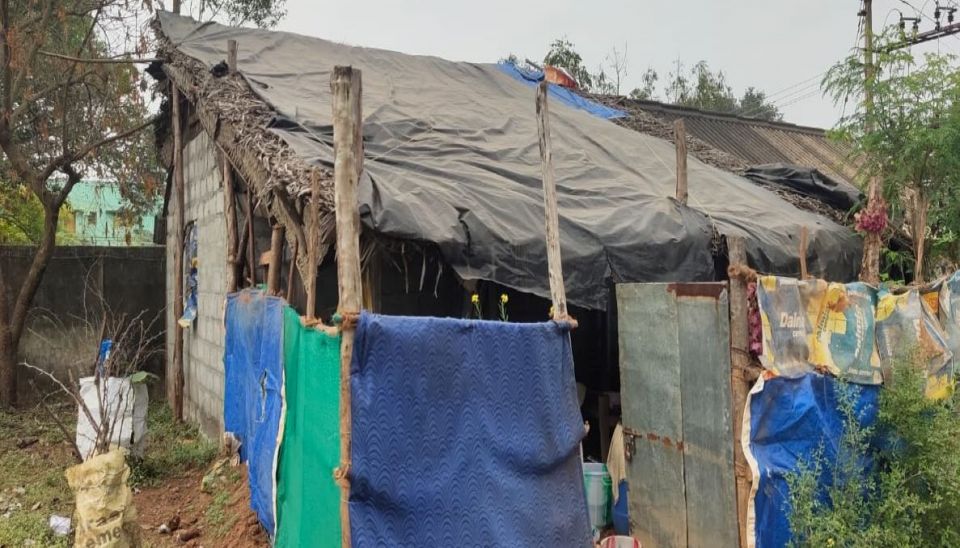GSR Horizons Pitchaimuthu.jpg

I remember a true story shared by a religious nun about when she was taking a class on the vow of poverty during an interreligious novitiate formation program in the Philippines. The story goes like this: Once a young boy rang the bell of a convent. As was the custom, a nun opened the gate and asked him with a smile, "What is your name? Where do you live? Have you eaten?"
The young boy, as expected, answered that he lived on the pavement with his four siblings and parents, and that he had not eaten yet. In exchange, the boy asked, "How many times do you eat?" The nun responded, "Besides snacks, we have three meals together."
The boy looked at the convent building and inquired, "Is this your home?" The nun modestly replied, "No. We live in this convent, but the house does not belong to any individual sister. We do not own anything because we take a vow of poverty."
The boy paused, then said, "I wish I could take the vow of poverty."
The evangelical vow of poverty is a very controversial and challenging issue. It is certainly challenging to live the vow of poverty in today's consumerist world. But even today many priests and religious have resolved to give up everything and live the vow of poverty radically. One such holy man died recently in India.
Fr. A. Pitchaimuthu, 82, a priest of the Archdiocese of Pondicherry and Cuddalore, died Jan. 30 at Virudhachalam in the south Indian state of Tamil Nadu. He gave a countercultural witness to the vow of poverty through his way of life. His funeral Mass was Jan. 31.
According to Fr. Devasagaya Raj, the former secretary of the Catholic Bishops Conference of India Dalits Commission, Pitchaimuthu — by his own labor — bought three acres of land to build an ashram near the Vriddhachalam railway station in Tamil Nadu; then he built a hut to live in. Later, when a cyclone blew away his hut, he rented a small thatched single-room hut. There he cooked, studied, received visitors, reached out to people and practiced Siddha, a form of herbal medicine practiced in India. He lived among one of the so-called lower caste people, the vannar (the laundry workers).
Pitchaimuthu kept his books in an open bookcase. In the same room there were tomatoes, fruits, and rice, and rats used to destroy the books. He did not scold anyone, nor did he scold the rats.
He was a Siddha doctor, an educationist — a trained teacher and institutional head — and an expert musician and singer who composed church hymns and a folk-style Roman Catholic Mass liturgy. He also started a shrine devoted to Our Lady in a village named Mugaiyur.
Though he earned much money from a salary as a professional teacher and from his other work, he gave up everything and embraced total evangelical poverty on his own, though it is not required for diocesan priests.
Pitchaimuthu was born into a Dalits family (a lower caste in India) and lived a very humble life from the beginning. Though he received every comfort after becoming a priest, he decided to live like Jesus — to live and preach in poverty. He mindfully rejected even the small comforts and luxuries that are usually considered basic needs.
Advertisement
Advertisement
Eventually, he left the comforts of the presbytery. For the last 10 years, he lived like a roadside dweller — like any other poor person in India. From his small hut, he composed hymns and provided health care to poor people.
Like Pitchaimuthu, many of us religious in India, come from very humble origins.
In the few years of formation and, as professed religious, it is easy for us to get into a secure, comfortable, organized, protected, and luxurious upper-middle-class life, and conveniently bend the vow of poverty to suit our comforts.
The Oxfam Inequality 2022 report provides a shocking revelation. The richest 98 Indians own as much wealth as the bottom 555 million people. The smaller proportion of rich and powerful houses become richer, while the vast majority of Indians become poorer — and the gap between these two groups increases day by day.
I assume this inequality report has not much affected religious in India. We associate with people who are rich or from this upper-middle-class background. At times, instead of influencing people around us, we get influenced by their lifestyle.
Once we get comfortable with all these luxuries of life, we tend to take everything for granted. Our reflections and talks on poverty hardly impact our lives.
In the last five years, I have deepened my understanding and tried to live out my poverty creatively.
My happiness does not depend on what I possess.
My happiness does not depend on what I possess — as I used to think — and that happiness never ends. Simplicity is bliss. Poverty is necessary to live our vocation meaningfully and authentically.
I had the urge to buy things that would make me look elegant and so got used to getting the best-looking dresses, but then I realized I am respected and loved for who I am, for my inner strength and my convictions.
This helps me to find newer meaning in my vow of poverty.
Sharing my time, resources, and experiences with those in need rewards me and make me happier and more useful. When I share the blessings I received and become a blessing to others, I am happier.
Today, the vow of poverty invites us to be on the side of the marginalized, the excluded and those whom society considers worthless. When I get closer to Jesus and his values, I get the courage to move ahead, convincingly facing the challenges of the world.
Consumerism is literally killing us. It is killing our planet. It is killing the life inside the ocean, in the air, and on the land.
A new secular lifestyle called minimalism, which in many ways challenges the consumerist culture of the world, is attracting many young people today. In a world controlled by corporate houses, where an excess of luxury is promoted as a way of life, Evangelical poverty calls us to give a countercultural witness by living our poverty in a meaningful way.
The vast majority of people in the developing countries have been pushed into utter poverty since the great economic crisis in many parts of the world, and COVID-19 lockdowns have wreaked havoc on the daily existence of the vast majority of people.
Pitchaimuthu has left an indelible impression on the clergy and religious of our country, and his legacy offers a challenge today.
Like what you're reading? Sign up for GSR e-newsletters!


